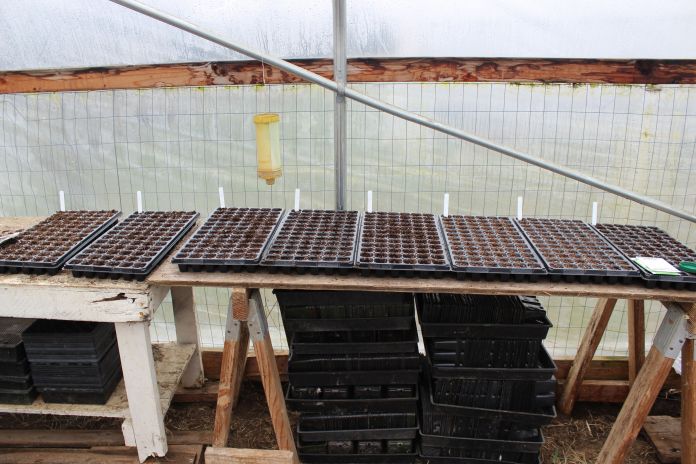ger·mi·nate
[jur-muh-neyt] verb (used without object), ger·mi·nat·ed, ger·mi·nat·ing. 1. to begin to grow or develop. 2. Botany a. to develop into a plant or individual, as a seed, spore, or bulb. b. to put forth shoots; sprout; pullulate. 3. to come into existence; begin. verb (used with object), ger·mi·nat·ed, ger·mi·nat·ing. 4. to cause to develop; produce. 5. to cause to come into existence; create.I’m back on the farm and it feels fantastic. Back out in the rain and wind, back in the greenhouses that smell musty and green and warm and alive despite the cold mud outside. Back with my hands in the (potting) soil, sowing seeds, waiting for the first signs of life–for germination. Coaxing these babies toward their big field debut.
Last year, sowing the first seeds of the season, I was pretty uncomfortable with the mystery of germination. (You mean these tiny little seeds will really grow up to be perfect heads of lettuce, broad broccoli plants, kale we can harvest again and again, tomatoes plants that will dip with the weight of their fruit?) It seems so very far away when you’re holding those little seeds in your hand. That you can kill them at about a dozen junctures, before they even get a chance to be planted out and dig in their roots, is a very real reality. That you might kill them even out in the field. So many little lives marching in the rows of those trays and beds.
This year I have more faith in this spring process. You sow seeds, and most of them will germinate. You water them and dote on them in their trays, and most will grow strong enough to transplant. You plant them in the field, and most of them grow up big and beautiful so you can harvest them and send them home with people to feed their families. I also feel better equipped. After many, many failures I’ve been reading and watching and observing my own attempts, making mental notes of improvements to make.
I remember when I first read that lettuce seeds need light to germinate. Ah-ha! I began just barely sprinkling their trays with soil to cover, and immediately we grew better transplants with much better germination. I started using a hand seeder for accuracy and to stop overcrowding cells, and couldn’t believe how much seed I’d been wasting up to that point. I read about how to test your transplants to see if they were ready to plant out (if their roots hug their little cell’s soil in close, you know you’re ready to roll). And then I watched our plantings, some of which had to go out early because we were behind, and how they struggled to recover from the shock of real ground beneath them. I watched batch after batch of starts struggle in poor quality or recycled potting soil, and understood why everyone harps on the importance of using the best. I watched tomatoes that we started too early get more and more root bound and leggy in their pots, and wished we could have done better. I learned that if you write your labels in pencil they don’t fade (!) or smear beyond readability (!). So many headaches saved!
This year, I think we can do better. We bought good potting soil. We’re investing in plug trays. I’m trying to water consistently. We’re building some hardening-off hoops. We’re taking steps.
I’ve been reading this book recently, and the first exercise the author has you do (before you read anything about farm enterprise budgets or paperwork flows) is an evaluation of your core values. Things like security, family, self-improvement, creativity, freedom, and so on. I’ve been thinking a lot about that, and also about what it is about farming specifically that I love. And I think a lot of it is summed up in these early spring tasks: the planning, the figuring out of systems & setting them up, the elementally creative process of sowing seeds. The bringing into the world of things that have value. There are other things I love–the urgency of the work, the speed of it, the smoothness of efficient movement, the small victories, eating the fruits of your labor and knowing that they will fuel you to go out and do it all again. But especially I love the germination phase–the “to begin to grow or develop,” and the “to cause to come into existence, to create.” It’s all in your head, you can see it perfectly, and then you go out and create it using nothing more than soil, water, air, sun, seeds, your body, and a few tools. Pretty amazing. And we get to do it again and again each year.
“A thought, even a possibility, can shatter and transform us.” ― Friedrich Nietzsche
The fields are wet and waiting. The seeds are in their trays. The possibilities are vast.
Be well,
b






Looks like everything is moving along nicely. I love your workstation!